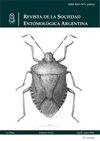阿根廷的生物防治:最新进展
IF 0.5
4区 农林科学
Q4 ENTOMOLOGY
引用次数: 0
摘要
生物控制(BC)可以自然发生(无需人类干预),也可以在研究和科学选择拮抗剂的结果下有意应用。它包括一个物种通过另一个物种的作用而减少种群密度。尽管应用BC在阿根廷的采用始于20世纪初,但它仍然是一门发展中的学科。在此背景下,我们设计了一份由15个问题组成的在线问卷,以评估该学科在该国的社会、经济和人口方面的现状。我们发现,目前有122人在不列颠哥伦比亚省工作,其中62%是女性。尽管调查显示,在该国17个司法管辖区从事不列颠哥伦比亚省工作的人,但大部分工作都在布宜诺斯艾利斯进行,82%的人在公共部门工作。节肢动物害虫的生物防治占BC项目的74%,这些项目主要通过经典BC进行。尽管在不列颠哥伦比亚省工作的人数有所增加,但我们提出了一系列建议,旨在进一步促进该学科在该国的发展。本文章由计算机程序翻译,如有差异,请以英文原文为准。
Biological control in Argentina: state of the art
Biological control (BC) can occur naturally (without human intervention), or by being applied intentionally when it is the result of research and the scientific selection of antagonists. It consists of the reduction in the population density of one species through the action of another. Although the adoption of applied BC in Argentina started at the beginning of the 20th century, it is still a developing discipline. In this context, we designed an online questionnaire consisting of 15 questions to assess the current status of pest BC and the social, economic and demographic aspects of the discipline in the country. We found that 122 people are currently working on BC, of which 62% are women. Although the survey revealed people working on BC in 17 jurisdictions of the country, most of the work is carried out in Buenos Aires, and 82% work in the public sector. Biological control of arthropod pests accounts for 74% of BC projects, which are mainly conducted through classical BC. Despite the fact there is an increase in the number of people working in BC, we offer a series of recommendations aimed at further favoring the growth of the discipline in the country.
求助全文
通过发布文献求助,成功后即可免费获取论文全文。
去求助
来源期刊

Revista De La Sociedad Entomologica Argentina
Agricultural and Biological Sciences-Insect Science
CiteScore
0.80
自引率
20.00%
发文量
31
审稿时长
20 weeks
 求助内容:
求助内容: 应助结果提醒方式:
应助结果提醒方式:


